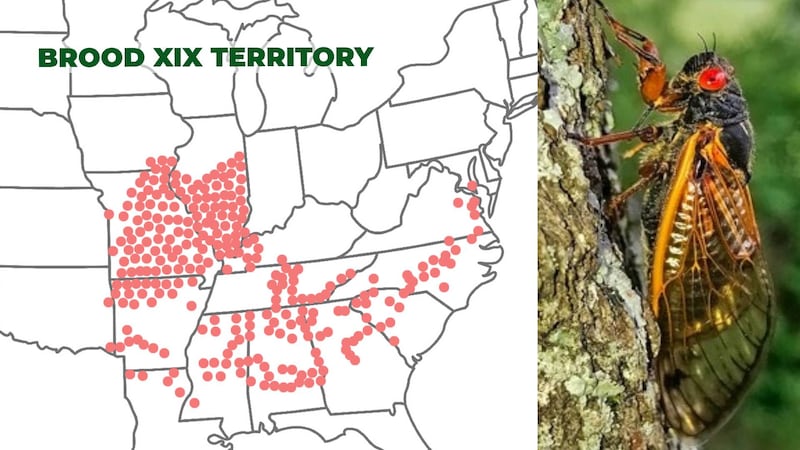Cicadas emerge 4 years early in Augusta region, surprising scientists

Wednesday, May 20, 2020
AUGUSTA, Ga. (WRDW/WAGT) -- Some cicadas are coming out to sing four years early in the CSRA, adding to the evening wildlife chorus.
Scientists were surprised by the early emergence of these 13-year cicadas — known to the experts as Brood XIX — in a swath of the country that runs right through the Augusta region.
The experts are relying on you to help solve the mystery.
They learned about it as they were focused on this year’s expected emergence of 17-year cicadas in southern Virginia, western Virginia and northwestern North Carolina. When the scientists were looking for those cicadas, they learned in April of emerging Brood XIX cicadas in Georgia, including the Augusta area.
Over the past two weeks, there have been more reports of Brood XIX cicadas emerging four years early. Brood XIX appears in patches of 17 states from Kansas to Virginia and from southeastern Iowa to northern Louisiana.
Dr. Gene Kritsky, dean of behavioral and natural sciences at Mount St. Joseph University, is
monitoring the phenomenon.
According to Kritsky, the world of cicadas is divided into two camps: ones that emerge from their underground nymph stage in 17-year cycles and ones that emerge in 13-year cycles. They come out after the soil temperature exceeds 64 degrees, usually in mid-May.
There are three types of 17-year cicadas and four types of 13-year cicadas. The 13-year cicada varieties in the Augusta region include Magicicada tredecim, Magicicada tredecassini and Magicicada tredecula.
Groups of cicadas that share the same emergence years are called broods. But not all of the cicada nymphs count the years correctly — hence the early emergence in our region.
Kritsky and his peers monitor the broods through an app that crowdsources much of the work. The Cicada Safari app, which he helped develop with the Center for IT Engagement at the university, is available for free.
of the public can submit photos and videos of cicadas and report their noisemaking, which lets the experts track the insects’ emergence and breeding habits. Each photo and video is verified before posting.
“We are asking people throughout the Brood XIX range to submit cicada photographs to help us get a better understanding of this early emergence,” Kritsky said.
Early emergences of 17-year cicadas are well-documented, but that’s not the case with 13-year cicadas.
He told News 12 that Augusta has one of the larger emergences of Brood XIX, so he’s eager for local residents to help him through the app.
“We are anxious to determine if the cicadas are emerging in such numbers that they are chorusing in your area,” he told News 12. “If they are, we are asking people using the Cicada Safari app to send us 10-second videos and photos, which they can do within the app. The videos will permit us to determine the species present and if mating is taking place.”
To Cicada Safari and help map the 2020 emergence, go to an app store and the app.
“Periodical cicadas are bugs of history," according to Kritsky. "They are generational events, and many people use the emergence to mark the age of time, recall key events in their lives and just where they were and what they were doing the last time the cicadas came out.
“We developed this app because so many people are fascinated by cicadas. This is true citizen science."















